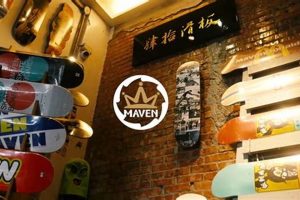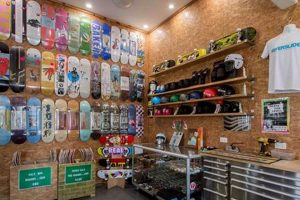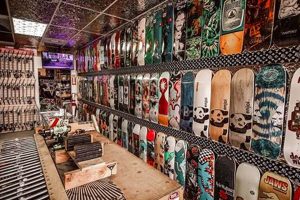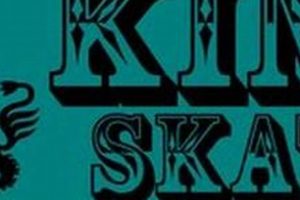The focus is a retail establishment specializing in skateboarding equipment and apparel, operating under a specific designation. This particular type of shop often caters to a niche market within the broader skateboarding community, sometimes emphasizing specific brands, styles, or subcultures. For instance, a location might prioritize hard-to-find skateboard decks or offer workshops for aspiring skaters.
Such a business can serve as a crucial hub for local skateboarders, providing not only equipment but also a sense of community and belonging. Historically, these establishments have played a vital role in shaping skateboarding culture, supporting local talent, and fostering the growth of the sport. The benefit extends beyond commerce; it’s about cultivating a shared passion.
The following sections will delve into the specific attributes, potential challenges, and overall impact of businesses of this nature, analyzing various aspects of their operation and contribution to the skateboarding landscape. Considerations include product selection, marketing strategies, and the establishment’s role within the larger skateboarding ecosystem.
Essential Considerations for Skateboarding Equipment Selection
The following guidelines provide crucial advice when acquiring skateboarding equipment, ensuring both safety and optimal performance for skateboarders of all skill levels. These are guidelines often shared by establishments specializing in skateboarding equipment, such as a retailer.
Tip 1: Prioritize Deck Construction. Select a skateboard deck constructed from high-quality maple wood. The number of plies and the pressing technique directly impact the deck’s durability and responsiveness. Investigate deck specifications before purchase.
Tip 2: Wheel Durometer Matters. Understand the significance of wheel durometer. Softer wheels (lower durometer) provide better grip and are suitable for street skating. Harder wheels (higher durometer) offer greater speed and are ideal for park skating. Choose wheels according to intended usage.
Tip 3: Bearing Precision is Critical. Opt for skateboard bearings with a high ABEC rating. While a higher rating indicates greater precision, it does not necessarily equate to increased durability. Consider bearing material and maintenance requirements.
Tip 4: Truck Selection Affects Stability. Choose skateboard trucks that match the width of the deck. The type of truck influences turning radius and overall stability. Research truck geometry and pivot cup composition.
Tip 5: Protective Gear is Non-Negotiable. Always wear a helmet, knee pads, elbow pads, and wrist guards. Properly fitted protective gear significantly reduces the risk of injury. Ensure that protective equipment meets safety standards.
Tip 6: Shoe Selection Impacts Board Feel. Select skateboarding shoes with a flat sole and reinforced stitching. Durable materials and a vulcanized construction enhance board feel and prevent premature wear. Consider ankle support based on skateboarding style.
These considerations represent essential factors in skateboarding equipment selection. Adherence to these guidelines ensures a safer and more enjoyable skateboarding experience.
The subsequent sections will examine additional aspects of skateboarding, including skill development and community engagement.
1. Product Curation
Product curation, in the context of a skateboarding retail establishment, is a critical factor determining the store’s identity and appeal to its target demographic. The selection of merchandise reflects the store’s philosophy and influences customer loyalty and perception.
- Brand Alignment
The brands carried by the establishment directly reflect its image and values. Curating products from established, reputable brands signals quality and reliability. Conversely, featuring emerging or independent brands can attract customers seeking unique or unconventional products. The choice to prioritize specific brands creates a distinct identity and attracts a specific customer base. For example, a shop focused on street skateboarding might prioritize brands known for durable decks and responsive trucks.
- Product Diversity
The range of products offered impacts the shop’s ability to cater to different skill levels and skateboarding styles. A well-curated selection includes decks, trucks, wheels, bearings, hardware, apparel, and protective gear, encompassing various price points and performance characteristics. Offering a diverse range of products attracts a wider customer base and positions the shop as a comprehensive resource for skateboarders. A focus solely on high-end products might alienate beginner or budget-conscious customers.
- Limited Editions and Exclusivity
Featuring limited edition or exclusive products can create a sense of scarcity and drive demand. Collaborations with artists or brands result in unique merchandise not available elsewhere, enhancing the shop’s appeal to collectors and enthusiasts. This strategy cultivates a sense of exclusivity and positions the shop as a destination for unique and sought-after items. The implementation of limited-release strategies necessitates careful inventory management and targeted marketing efforts.
- Community Relevance
Product selection must consider local skateboarding trends and community preferences. Stocking products that cater to the specific needs and interests of local skaters demonstrates a commitment to the community. This includes supporting local brands, sponsoring local skaters, and hosting events that showcase local talent. A retail establishment embedded in the community fosters customer loyalty and positive word-of-mouth referrals. Ignoring local preferences can lead to inventory stagnation and decreased customer engagement.
These elements of product curation intertwine to define the establishment’s place in the skateboarding ecosystem. A deliberate and thoughtful approach to product selection can enhance its brand image, attract a loyal customer base, and contribute to the growth and vitality of the local skateboarding community. Ultimately, the success of this retail establishment hinges on its ability to understand and cater to the evolving needs of its target market.
2. Community Hub
A skateboarding retail establishment often functions as a community hub, serving as a central gathering point for skateboarders of varying skill levels and backgrounds. The designation as a “community hub” is not merely a marketing term but reflects a tangible role within the local skateboarding scene. The existence of such a space fosters social interaction, knowledge sharing, and the cultivation of a shared identity among skateboarders. Without this central point, the skateboarding community risks fragmentation, diminished social cohesion, and reduced opportunities for skill development and mentorship. An example is a local shop hosting weekly skate sessions or workshops, providing a structured environment for skateboarders to connect and learn from one another. This actively shapes the skateboarding culture, providing support, guidance, and camaraderie.
The practical significance of understanding the community hub aspect extends to business operations. A skate shop recognized as a hub cultivates customer loyalty and benefits from word-of-mouth marketing. Events, workshops, and sponsored activities generate foot traffic and enhance the store’s visibility. Furthermore, actively engaging with the community provides valuable feedback, enabling the shop to tailor its product selection and services to meet the specific needs of local skateboarders. In contrast, a retail establishment that disregards the community aspect may struggle to attract and retain customers, leading to diminished profitability and relevance. The distinction lies in the recognition and active support of the skateboarding community, not just the transactional selling of goods.
In summary, the concept of the skateboarding establishment as a community hub is pivotal to its success and the overall vitality of the local skateboarding scene. Recognizing and fostering this role yields significant benefits, including increased customer loyalty, enhanced visibility, and a deeper connection with the target market. Ignoring this aspect risks undermining the shop’s potential and hindering the growth of the skateboarding community. The ability to balance commerce with community is critical for long-term sustainability and relevance.
3. Brand Identity
Brand identity, for a retail establishment, particularly a skateboard shop, serves as a crucial determinant of customer perception, loyalty, and overall market position. For a business operating under a specific designation, the established brand identity profoundly influences its ability to attract and retain a specific clientele, differentiate itself from competitors, and cultivate a strong connection with the skateboarding community. A well-defined brand identity extends beyond a mere logo or color scheme; it embodies the shop’s values, mission, and the unique experience it offers to its customers. The absence of a clearly defined brand identity leads to customer confusion, diminished loyalty, and an inability to establish a sustainable competitive advantage. For instance, a shop aiming to project an image of authenticity and support for independent brands would carefully curate its product selection, collaborate with local artists, and actively participate in community events. Conversely, a shop prioritizing a mainstream appeal would focus on stocking popular brands, utilizing conventional marketing strategies, and maintaining a broader inventory to cater to diverse customer preferences.
The development and maintenance of a strong brand identity necessitates a consistent and cohesive approach across all aspects of the business, from product selection and store design to customer service and marketing communications. For a skateboard shop, brand identity can be communicated through various channels, including the store’s physical appearance, online presence, social media activity, and the overall customer experience. Practical application includes active engagement with the local skateboarding scene, sponsoring local skaters, organizing community events, and providing a welcoming and inclusive environment for all customers. This fosters a sense of belonging and strengthens the shop’s connection with its target market. A failure to maintain consistency across these channels can erode customer trust and dilute the brand’s message, leading to a disconnect between the shop and its intended audience. For example, a shop portraying an image of sustainability and environmental responsibility must ensure that its products are ethically sourced and that its operations minimize environmental impact. Any deviation from these principles will undermine the brand’s credibility and alienate customers who value sustainability.
In conclusion, brand identity is an indispensable component of a skateboarding retail establishment, influencing its ability to attract and retain customers, differentiate itself from competitors, and cultivate a strong connection with the skateboarding community. Establishing and maintaining a clear and consistent brand identity requires a cohesive approach across all aspects of the business and a deep understanding of the target market’s values, needs, and preferences. While building and nurturing brand identity poses challenges, including the need for ongoing investment and adaptation to changing market trends, the long-term benefits of a strong and authentic brand far outweigh the associated costs. Ultimately, a well-defined brand identity allows a skateboarding shop to transcend the mere selling of goods and become a respected and valued member of the skateboarding community.
4. Local Support
A critical facet of an establishment’s success lies in the reciprocal relationship it cultivates with its immediate surroundings. The term “Local Support,” when applied to a skateboarding retail establishment, specifically denotes the mutual benefit derived from active engagement and investment within the geographic community it serves. This support encompasses several interwoven components, including patronage from local skateboarders, collaboration with local artists and businesses, sponsorship of local events, and advocacy for local skateboarding infrastructure. The absence of this support often leads to isolation, diminished customer loyalty, and an inability to thrive in a competitive market. For instance, a skate shop located in a community without a dedicated skate park might actively lobby local government for its construction, demonstrating a commitment beyond mere commercial interests. This not only enhances the skateboarding experience for local residents but also positions the shop as a proactive community partner.
The practical significance of understanding the symbiotic relationship between a retail establishment and its surrounding environment extends to various aspects of its operation. A shop actively supporting local skateboarders through sponsorships or product donations fosters a sense of loyalty and advocacy among its customers. Collaborations with local artists on limited-edition merchandise or in-store murals enhance the shop’s aesthetic appeal and create a unique customer experience. Furthermore, participation in local events, such as skateboarding competitions or community festivals, increases the shop’s visibility and strengthens its connection with potential customers. In contrast, a retail establishment that operates solely on a transactional basis, without actively engaging with and supporting the local skateboarding community, risks alienating its customer base and failing to cultivate the loyalty necessary for long-term sustainability. This often manifests as a perceived lack of authenticity and a failure to resonate with the values and aspirations of local skateboarders.
In summary, “Local Support” represents a cornerstone of a retail establishment’s long-term viability and its contribution to the skateboarding community. Actively engaging with local skateboarders, businesses, and organizations fosters a sense of mutual benefit and strengthens the shop’s connection with its target market. Challenges include the need for consistent investment and a genuine commitment to the community, rather than mere performative gestures. However, the rewards of cultivating strong local ties far outweigh the associated costs, positioning the shop as a respected and valued member of the skateboarding community. The establishments success is, therefore, intrinsically linked to the prosperity and well-being of the skateboarding scene within its local environment.
5. Knowledge Source
The role of a “blacklist skate shop” as a “Knowledge Source” is integral to its function within the skateboarding community. This designation extends beyond simply selling merchandise; it signifies the establishment as a repository of expertise and information pertinent to skateboarding. The impact of this extends from assisting beginners with equipment selection to advising experienced skaters on advanced techniques. The cause-and-effect relationship is evident: a skate shop that actively cultivates and disseminates knowledge fosters a more informed and engaged customer base. This ultimately contributes to the growth and development of the local skateboarding scene. For example, a shop might host workshops on skateboard maintenance, construction, or history, thereby educating customers and solidifying its position as a credible authority. The importance of this role cannot be overstated; a knowledgeable shop staff can guide purchasing decisions, prevent injuries through proper equipment advice, and promote a deeper understanding of skateboarding culture.
The practical significance of understanding this “Knowledge Source” component manifests in several ways. For the business, it translates to increased customer trust and loyalty. Customers are more likely to return to a shop where they receive accurate and helpful information. The staff’s expertise also allows for more effective product recommendations, leading to higher sales and reduced returns. Furthermore, acting as a “Knowledge Source” positions the shop as a valuable resource for the local community, fostering a sense of goodwill and contributing to its overall reputation. Conversely, a shop lacking in knowledgeable staff and failing to provide relevant information risks losing customers to competitors who prioritize education and customer service. Skateboarding, being a technically demanding activity, necessitates access to reliable information, making the “Knowledge Source” role a competitive differentiator.
In conclusion, the establishment’s function as a “Knowledge Source” is a vital component of its identity and success. The deliberate cultivation and dissemination of skateboarding-related information fosters a more informed customer base, builds trust, and contributes to the overall vitality of the local skateboarding scene. The challenges inherent in maintaining a high level of expertise require ongoing training and a commitment to staying abreast of evolving skateboarding trends and technologies. However, the rewards of embracing this role far outweigh the effort, solidifying the shop’s position as a trusted resource and a valued member of the community. This directly impacts the shop’s long-term sustainability and its ability to influence the culture of skateboarding within its service area.
Frequently Asked Questions
The following represents common inquiries regarding skateboard retail establishments and their role within the skateboarding community. Clarification of these points provides valuable context for understanding the dynamics of this specialized market.
Question 1: What defines a specialized skateboard retail establishment?
A specialized skateboard retail establishment focuses primarily on skateboarding-related products and services. This often includes a curated selection of decks, trucks, wheels, bearings, apparel, and protective gear, catering to various skill levels and skateboarding styles.
Question 2: How does a skateboard shop contribute to the local skateboarding scene?
A shop supports the local scene by sponsoring skaters, hosting events, providing a gathering place for the community, and advocating for skateboarding infrastructure (e.g., skate parks).
Question 3: What factors should be considered when selecting a skateboard deck?
Deck construction material (typically maple), width, length, concave, and graphic design are important considerations. Individual preferences and intended skateboarding style will influence the optimal choice.
Question 4: Why is protective gear essential for skateboarding?
Protective gear, including helmets, knee pads, elbow pads, and wrist guards, significantly reduces the risk of injury. Skateboarding inherently involves potential for falls and impacts, necessitating the use of appropriate safety equipment.
Question 5: How does wheel durometer affect skateboarding performance?
Wheel durometer (hardness) influences grip, speed, and suitability for different terrains. Softer wheels (lower durometer) provide better grip, while harder wheels (higher durometer) offer greater speed. Selection depends on the intended skateboarding style and environment.
Question 6: What are the benefits of purchasing skateboarding equipment from a specialized retailer versus a general sporting goods store?
Specialized retailers typically possess greater expertise, offer a wider selection of skateboarding-specific products, and provide a more personalized customer service experience tailored to the needs of skateboarders.
These questions address fundamental aspects of skateboard retail and the considerations involved in equipment selection. Understanding these points enhances the skateboarding experience and promotes informed decision-making.
The subsequent section will explore potential challenges faced by skateboard retail establishments and strategies for overcoming those challenges.
Conclusion
The preceding analysis has explored the multifaceted role and significance of a retail establishment within the skateboarding ecosystem. Key elements, including product curation, community engagement, brand identity, local support, and knowledge dissemination, collectively shape its position and impact.
The continued vitality of such establishments relies on a sustained commitment to these principles, ensuring they remain relevant, trustworthy, and integral components of the skateboarding community. A proactive and community-focused approach is essential for navigating the evolving landscape of skateboarding retail.







